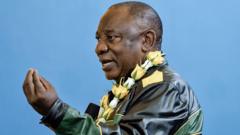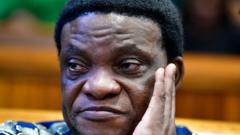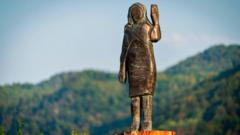During a meeting between U.S. President Donald Trump and South African President Cyril Ramaphosa, unexpected tensions arose as Trump showcased a video and documents asserting racial persecution against white South Africans. This allegation forms part of Trump's narrative that often includes unproven claims of land seizures and violence against Afrikaners. Notably, while Ramaphosa attempted to articulate the realities within his nation, Trump's attention remained fixated on his printed materials, emphatically repeating phrases like “Death, death, death.”
**Trump's Meeting with South African President Sparks Controversy Over Claims of Racial Persecution**

**Trump's Meeting with South African President Sparks Controversy Over Claims of Racial Persecution**
In a recent White House meeting, President Trump presented controversial claims regarding racial issues in South Africa while dismissing President Cyril Ramaphosa's explanations.
Zolan Kanno-Youngs, a White House correspondent, characterized the situation where Ramaphosa sought to clarify South Africa’s circumstances, yet Trump perpetuated conspiracy theories. Contextually, while it's acknowledged that there have been violent incidents involving white South Africans, statistical data suggests that their homicide rates are not disproportionately higher than those of other demographics in the country.
This meeting occurs amidst shifts in U.S. immigration policy, wherein the Biden administration has curbed refugee opportunities for many groups but has welcomed white South Africans. Such a stance reflects underlying tensions and policy implications regarding racial and ethnic narratives prevalent both in South Africa and within the U.S. political landscape.
This meeting occurs amidst shifts in U.S. immigration policy, wherein the Biden administration has curbed refugee opportunities for many groups but has welcomed white South Africans. Such a stance reflects underlying tensions and policy implications regarding racial and ethnic narratives prevalent both in South Africa and within the U.S. political landscape.




















